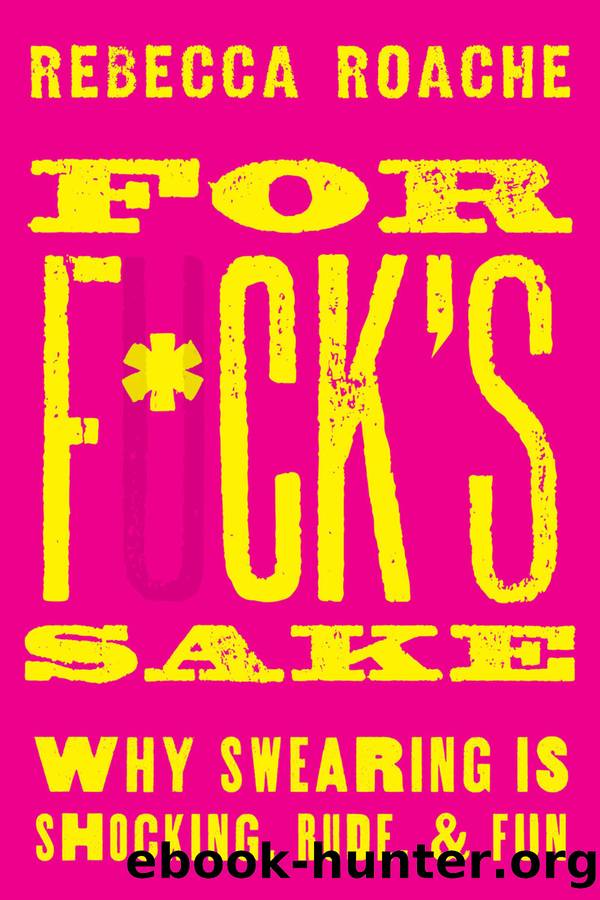For F*ck's Sake by Rebecca Roache

Author:Rebecca Roache
Language: eng
Format: epub
Publisher: Oxford University Press
Published: 2023-02-15T00:00:00+00:00
You might be wondering: if weâre supposed to judge the blameworthiness of sweary behaviour by comparing it to non-sweary behaviour, how is this a way of judging the blameworthiness of swearing at all? According to this view, swearing looks like merely an aggravating factor: it can make already-objectionable behaviour (like, say, making threats) worse, but without any other objectionable behaviour, itâs not objectionable enough to regulate. In this respect, we can compare it to things like volume of speech and aggressive body language.
Letâs take a moment to consider this idea of swearing as an aggravating factor. The reality is more nuanced than it might at first seem. Swearing cannot make the difference between whether or not the speaker performs an illocutionary act. Chucking a fuck or a bollocks into an utterance canât turn it into an order or a question or a threat if it would not otherwise have been an order or a question or a threat, and removing swear words from a warning or a resignation or an acceptance canât stop it being a warning or a resignation or an acceptance. Swearing can, however, alter the mood of our illocutionary acts. It does this by expressing the speakerâs emotions and their attitude towards the listener and perhaps also the social context. A person who says to their employer âI fucking resignâ, instead of simply âI resignâ, not only resigns but also expresses a certain attitude towards their employer and/or their job. By expressing the speakerâs attitude in this way, it can intensify the act that the speaker is performing: swearing in the course of threatening someone typically emphasises the threat, making it seem more credible, authentic, andâwell, threatening. If the illocutionary act in question is objectionable, as threats often are, the addition of swearing can be an aggravating factor. It can, in other words, make an already-objectionable act yet more objectionable. But this is not always the case, and it depends on the context and the relationship between the speaker and the listener. In some cases, swearing in the course of performing an objectionable illocutionary act can indicate to the listener that one is not serious, and so mitigates or cancels rather than aggravates the act. In cases where the illocutionary act in question is not objectionable, mitigating or cancelling it can turn it into something objectionable. The sweary insult in âI apologise, you shitheadâ might indicate to the listener that the speakerâs apology is insincere, which undermines the reconciliatory effect that apologising typically has, and might make a future reconciliation more difficult. But context is key: in some cases, the same utterance might be more reconciliatory than a swear-free apology, because the swearing might inject a welcome bit of levity into an otherwise solemn business. And while swearing may in general lend a sense of urgency to an order, in World War I the familiar, everyday order to âget your fucking riflesâ was recognised as much less grave and urgent than the order to âget your riflesâ (Brophy and Partridge 1930).
Download
This site does not store any files on its server. We only index and link to content provided by other sites. Please contact the content providers to delete copyright contents if any and email us, we'll remove relevant links or contents immediately.
The remains of the day by Kazuo Ishiguro(8999)
Tools of Titans by Timothy Ferriss(8396)
Giovanni's Room by James Baldwin(7346)
The Black Swan by Nassim Nicholas Taleb(7129)
Inner Engineering: A Yogi's Guide to Joy by Sadhguru(6794)
The Way of Zen by Alan W. Watts(6614)
The Power of Now: A Guide to Spiritual Enlightenment by Eckhart Tolle(5781)
Asking the Right Questions: A Guide to Critical Thinking by M. Neil Browne & Stuart M. Keeley(5775)
The Six Wives Of Henry VIII (WOMEN IN HISTORY) by Fraser Antonia(5515)
Astrophysics for People in a Hurry by Neil DeGrasse Tyson(5190)
Housekeeping by Marilynne Robinson(4447)
12 Rules for Life by Jordan B. Peterson(4304)
Ikigai by Héctor García & Francesc Miralles(4274)
Double Down (Diary of a Wimpy Kid Book 11) by Jeff Kinney(4272)
The Ethical Slut by Janet W. Hardy(4253)
Skin in the Game by Nassim Nicholas Taleb(4248)
The Art of Happiness by The Dalai Lama(4130)
Skin in the Game: Hidden Asymmetries in Daily Life by Nassim Nicholas Taleb(4006)
Walking by Henry David Thoreau(3962)
